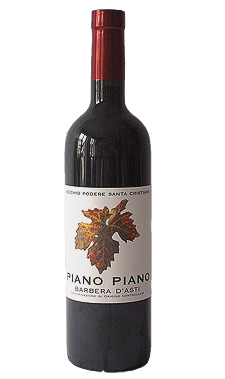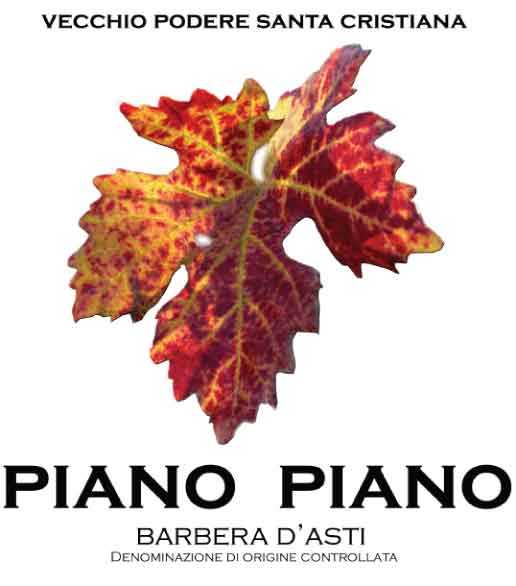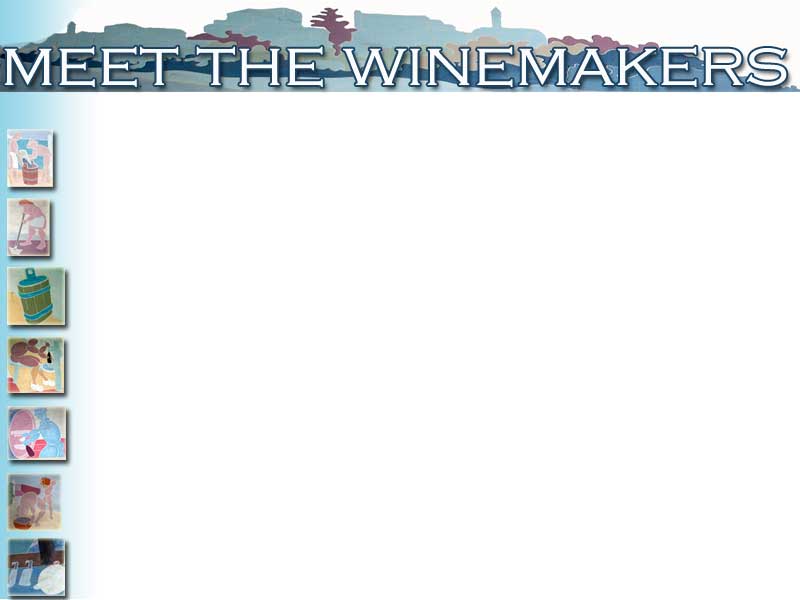PHIL & INGRID BLADES
Castelnuovo Belbo, Asti, Italy
Available to buy in the UK today is the Blades' "Piano Piano" 2007 Barbera d'Asti DOC
 |
This award winning wine is only £14.99 per bottle (£89.94 per 6 bottle case) Note min order is 12 bottles in any combination of 6 bottles - Winemaker - Phil & Ingrid Blades |
“When you casually pour the luxuriant red liquid into your glass we would ask you to take a few moments to contemplate the effort and energy that has gone into its production. Its full life cycle from vine to wine has taken passion, skill, a lot of luck and just a little madness”.
Phil & Ingrid Blades
Gaining Momentum -
now in our fifth year as
vineyard owners and winemakers
Phil & Ingrid are now in their fifth year of wine making with their first vintage [2005] Barbera d'Asti already sold. They will shortly release the outstanding 2007 vintage of Piano Piano and have completed the 2009 grape harvest.
When we started our wine business in Piedmont in 2004 we proudly set up our web site and called ourselves winemakers. With more enthusiasm then knowledge and more passion then sense, we swopped our business suits for farm apparel and our leather soled shoes for welly boots and training shoes. Now, five
years later, we would call ourselves first and foremost farmers, then winemakers, and finally business managers. The truth is that to be successful we have to be all three, increasingly in equal proportions.

Our evolving philosophy:
The phillosphy we adopted during our first year in Piedmont is still very much part of our life. We believe that great wines start in the ground and the management of the vineyard is equally as important as production techniques in the cellar. For us wine making does not start at the door of the cantina, but in the ground, the best wine makers are also farmers. All wines tell the story of the grapes they have come from. The grape reflects in its character the care and attention of the artisans that grow the vine from root stock to mature plant. It reflects the nurturing and care that the farmer takes in caring for the land and surrounding environments in which the vine grows. Anything that upsets its natural balance ultimately produces inferior wines.
Striving for Quality and Greatness in Wines? :
All wine is the end product of grape juice fermentation. With modern production techniques knowledgeable enologists can take grapes grown anywhere in the world, blend them in vats according to a chemical recipe and churn out predictable, pleasant wines that taste the same year after year. Supermarkets sell thousands of bottles of such wines and to some extent shape consumer’s choice and perceptions of quality because of their competitive pricing ability. Phil and Ingrid’s approach to wine production however is very different. They strive for quality and greatness in wine that is defined by the intensity of the varietal character of the grape and its unique sense of place.
Phil states that “we want our wines to reflect the tastes of our specific grapes grown in the specific region best suited to the varietal. We don’t want to produce wines that taste predictably like many modern wines from all over the world. Piedmont as a region has something unique to offer, lose that and we become just another producer of easy drinking wine with little individual character”.
Ingrid adds that “it is important not to confuse greatness with quality ratings. The grapes that make our wines all comply with the Italian Denominazione di Origine Controllata system for wine control [normally abbreviated to be called D.O.C.]. So quality is guaranteed at least to a minimum standard. Greatness however comes from the wines particular character, predictable wines lack greatness”
Note - since writing we are pleased to say that our Barbera d'Asti has bow been awarded the presdigous DOCG title.


Appreciating Quality and Greatness in Wine
Designating any wine as a ‘great wine’ is fraught with difficulty because so much depends on personal taste. In addition a wine may only display its true ‘greatness’ when drunk and appreciated in optimal circumstances. For example drinking the delicate Moscato at room temperature while munching crisps, will do little to enhance its flavours. Drink it chilled on a sunny afternoon with freshly baked Amaretti biscuits and it becomes a very different experience. Similarly red wines of character rarely drink well straight from the bottle, decanting them and allowing time for the wine to breath, can make an enormous difference to the taste. Red Barbera wines are full bodied and flavour can be greatly enhanced by pairing well with appropriate food. Ingrid and Phil believe that there is a lot of pretension about wine appreciation which often puts people off trying to learn more. They encourage people not to be intimidated by any of the hype or high brow wine speak.
Phil explains “people who enjoy wine can easily learn to appreciate ‘great wine’ by simply learning a little about grape varieties and growing regions. Wine labels themselves can be very confusing so the secret is to identify grape varieties you like and then try and find wines made from grapes that have been grown in the best regions for the variety. With a little knowledge it is possible to become more confident about wine choices. Also experiment with pairing different wines with different foods”.
Ingrid states “one of the things we enjoy most is doing wine tastings for people; it’s really satisfying when people start to understand the cultural aspects of wine. Taking the time to socialize with friends or family over a good meal paired with suitable wine, can feel really good. In Italy people rarely drink wine without food, even if it is only nibbles, it makes such a difference to the taste and the overall experience, wine is an intimate drink.”
Extracts from the 2005 Archives - A dream come true:
It was our romantic dream of owning a vineyard that provided the impetus leading to our big life change. Initially though the influence of common sense dictated that we content ourselves with the idea of buying a holiday home in one of our favourite European wine growing areas. It’s ironic that after two years searching for this holiday home in either France or Tuscany, we sell everything to buy a vineyard in a wine area that we had never been to. Two factors contributed to this situation, firstly web based research and secondly finding a good house agent to work with. Our discovery of Piedmont’s potential was the fruit of our labours from hours of internet research. The fact that it still seemed to be relatively undiscovered increased its appeal for us enormously. When we also figured out its geographic location meant that it was both surrounded by the magnificent Alps and close to the delights of the Italian Rivera, we thought that it warranted a closer look. So using the excellent services of a Piedmont based estate agent, we came; we saw, we fell in love and we stayed.
It's a learning experience:
It’s hard to believe that it’s now just over a year ago that we bought our 4 hectare vineyard, Vecchio Podera Santa Christiana. It’s been a roller coaster ride and we continue to learn much, indeed something new every day. During this year for the first time in our lives, we have practiced the fine art of growing grapes and turning them into wine. Perhaps the most profound lesson we have learnt is that in all stages of this slow process, nothing is more important than getting the basics right. For us, it all starts with ensuring our vines grow in harmony with the earth in a sustainable and natural way. This eminently sensible approach is not actually as easy to achieve as it might seem, indeed it can be really complicated. First let us explain that we did not start out with any rigid ideas about what represented good vineyard husbandry. Our cautious approach has been influenced as much by lack of knowledge than by any high brow ideals. As we simply had little idea of how or when to use chemical fertilisers or weed killing herbicides, we did not use them. Looking back over our first year, it is amazing that we complete novices have survived what nature threw at us. We have done so by investing in expertise [and it does not come cheap], some luck and having the advice of great neighbours and friends. But by far the biggest factor in our struggle to become competent wine producers has been the many, many, many hours of back breaking work that we have put in around our 10 acres. Believing that the best way to acquire the necessary skills is to do much of the work ourselves, we have been totally hands on. One of our most physically demanding chores has been the months of early morning manual hoeing between the vines. As we hoe, the weeds are left to rot on the ground and work as an organic fertiliser. But before we can feel smug about this environmentally friendly approach, we discover that the weeds themselves can become infected with mould or fungi. Suddenly doing our green thing is fraught with risk. We might inadvertently introduce harmful spores into the earth around the vines. To mount our defence against such an occurrence, we rapidly had to become knowledgeable about hazardous vine diseases. The key imperative is to be adept at spotting early signs of trouble. More sleepless nights followed as we discovered just how many potential vine killing diseases there are. We had days of prowling through our plants imagining that every spot and mark on the foliage meant we had rampant infections about to kill off our entire crop. Ok we are still not experts, but at least we do not now have a panic attack if we spot a brown leaf on the vines.
Cross contamination is a real big worry for vineyard owners. Its not enough just to look after the vines, the whole eco system must be managed. There is no good substitute to working in the fields and knowing what is happening with every plant, tree, shrub and vine.
The more intimate we become with working with the land, the more we appreciate that despite mans amazing progress in science and technology, nature still remains a force we cannot control. This year, nature has thrown many tantrums at us, storms with hail stones in the summer, too much heat early in the season and later when the grapes should have been baking in sunshine, we had rain that formed rivers through our vineyards. We have had pests, mould, fungi and virus alerts. In our newly planted vineyard we have choking weeds that grow twice as fast and five times as big as our baby vines. Despite all this we harvested our Moscato grapes achieving a similar yield as the 2004 harvest. Their sugar content [very important for Moscato wine quality] was one of the highest in the area. We fretted for even longer about the effect of the inclement weather on the sugar and acidity levels of the grapes from our 45 year old Barbera grapevines. In order to allow more time to reduce the acidity levels, we harvested the grapes later than most of the other wine growers around us. This was risky because the weather was very unsettled and heavy or prolonged rain would lower the sugar levels again. It was only after the harvest when the grapes were fermenting in their vats that we could relax. Thankfully our Barbera wine is shaping up well and tastes surprisingly good even at this immature stage. Our experts tell us we had a great ‘malolactic fermentation [ML]’. This is a reaction that is carried out by malolactic bacteria if conditions are right. For the chemists among you L[-]malic acid [four-carbon backbone, di-acid] is transformed into L[+] lactic acid [three-carbon mono-acid]. The fourth carbon is released as carbondioxide. We non-chemists understand that the main results of this fermentation are the reduction of acidity and the development of a special ‘vino bouquet’. Apparently this reaction is not so desirable in white wine production because it has potential to reduce the fruity flavour. In red wines it adds complexity and enhances bouquet so we are delighted to hear that our ML fermentation has been good. We have to be patient though because it will be at least another year before our red wine is ready to drink, indeed if it lives up to its early promise we might age it even longer in wood. Our hope is to be able to produce a quality ‘Barbera Superiore’.
Our philosophy:
We now understand that success in a vineyard cannot be measured on one or even five years produce. Longevity must be planned for otherwise the eventual cost is too high. Over stress the vine with too much fertilisation and you very quickly burn the plant out. If you do not get the pruning right and the plant is allowed to over produce grapes, the vine will die prematurely. Sterilise the earth with chemical herbicides and you upset the organic balance that provides the plants with nourishment and natural protection. Unintelligent spraying with insecticides can be equally damaging as it just encourages more resistant strains to evolve. Getting quality grapes from vines that will last for 70years or more requires a different mind set to an approach that reaps profits from a few years of big yields. There is a delicate balance to be maintained over time, production of good wine cannot be hurried. The advice of our neighbouring farmers has helped us understand that in nature, less often means more. We are grateful that they are coaching us in the traditional methods which have been passed down through generations. A heritage like the one we have found in Piedmont deserves to be safeguarded and promoted to ensure that all its potential is understood by others who will benefit from its example. Living here has made us appreciate that what really makes this place special is the respect, love and passion the wine grower’s show for the land and the wine they create. A lot of the wine comes from small producers like ourselves whose energy is tied to the land they work and their satisfaction with the quality of wines they produce.
The advice of our neighbouring farmers has helped us understand that in nature, less often means more. We are grateful that they are coaching us in the traditional methods which have been passed down through generations. A heritage like the one we have found in Piedmont deserves to be safeguarded and promoted to ensure that all its potential is understood by others who will benefit from its example. Living here has made us appreciate that what really makes this place special is the respect, love and passion the wine grower’s show for the land and the wine they create. A lot of the wine comes from small producers like ourselves whose energy is tied to the land they work and their satisfaction with the quality of wines they produce.
We believe that success in a vineyard cannot be measured on one or even five years produce. Longevity must be planned for otherwise the eventual cost is too high. Over stress the vine with too much fertilisation and you very quickly burn the plant out. If you do not get the pruning right and the plant is allowed to over produce grapes, the vine will die prematurely. Sterilise the earth with chemical herbicides and you upset the organic balance that provides the plants with nourishment and natural protection. Unintelligent spraying with insecticides can be equally damaging as it just encourages more resistant strains to evolve. Getting quality grapes from vines that will last for 70years or more requires a different mind set to an approach that reaps profits from a few years of big yields. There is a delicate balance to be maintained over time, production of good wine cannot be hurried.
It’s imperative that somehow we convince the world that there are no shortcuts with nature.
They have chosen to name their wine "Piano, Piano". By way of explanation here is an extract from the wines lable:
"We are proud to present our first vintage for your enjoyment.
We moved to Piemonte from England 18 months ago and
have been working hard to develop our vineyards, learn all
the skills of cultivating the vines and of course make the wine.
At every turn our friends and neighbours have encouraged
and mentored us, they often use the words “Piano, Piano”
meaning “Slowly, Slowly”. We hope you will savour this
wine in the same way.
Best enjoyed sitting around the pool of our vineyard B&B
visit www.stayinpiedmont.com"
If you have read this far, you may like to read our vineyard diary here.
back to meet the winemakers
